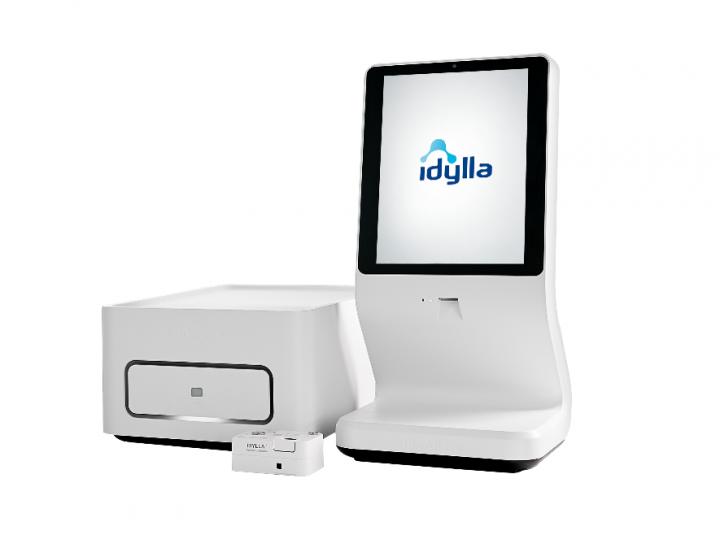Multicenter study led by Dartmouth’s and Dartmouth-Hitchcock’s Norris Cotton Cancer Center shows vastly improved turnaround time to get results from the lab to the oncologist using the newest technology in the cancer testing space.

Credit: Biocartis
LEBANON, NH – Genomic mutation testing is critical to therapeutic selection and management of patients with colorectal cancer. In a new multicenter study, researchers compared a new cartridge-based laboratory testing device called the IdyllaTM automated system (Biocartis) to current standard-of-care testing methods. They found that average turnaround time for test results could be cut by more than 65% from 15 days to 5 days, with some results available in a single day. The significant decrease in wait time means patients can begin appropriate treatments for colorectal cancer much sooner. The simplicity and ease of use of the new technology compared with other molecular techniques also makes it suitable for integration into clinical laboratories of any size, including those that may not have much molecular expertise.
“This is the first such study to address turnaround time for when the oncologist receives clinically actionable results from the lab,” says lead author Gregory J. Tsongalis, PhD, of Dartmouth’s and Dartmouth-Hitchcock’s Norris Cotton Cancer Center. “Getting results to our oncologists in a timely fashion allows them to be better prepared in the selection of a therapeutic management strategy.” Results of the study, “Comparison of Tissue Molecular Biomarker Testing Turnaround Times and Concordance Between Standard of Care and the Biocartis Idylla Platform in Patients With Colorectal Cancer,” are newly published online in the American Journal of Clinical Pathology.
Also significant in this study is the participation of 20 laboratories of different types and sizes–not just larger academic center labs–throughout the United States and Puerto Rico, with an accrual of almost 800 colorectal cancer tissue samples to measure. In collecting the data, the study also addressed the use of minimal tissue from the patient sample. “One of the study sites included several 1-mm tissue biopsy samples, showing that even smaller tissue-based specimens can be successfully analyzed by Idylla,” notes Tsongalis. “Our results are in line with findings of other studies showing successful analyses using very small tissue amounts, including those deemed too small for standard molecular testing methods.”
Next steps include looking at strategies to integrate the new platform into regular laboratory processes. “We already use something similar for our melanoma patients,” notes Tsongalis. As the majority of care of cancer patients in the United States is provided in smaller medical facilities, this user-friendly system would allow those institutions to offer the most clinically actionable testing at their own hospitals with minimal hands-on time for testing and rapid result reporting.
###
Gregory Tsongalis, PhD, HCLD, CC, is a Professor and Vice Chair of Research in the Department of Pathology and Laboratory Medicine at Dartmouth’s Geisel School of Medicine, as well as Director of Clinical Genomics and Advanced Technology and member of the Cancer Biology and Therapeutics Research Program at Dartmouth’s and Dartmouth-Hitchcock’s Norris Cotton Cancer Center. His research interests include development of advanced diagnostic technologies and disease biomarker discovery.
About Norris Cotton Cancer Center
Norris Cotton Cancer Center, located on the campus of Dartmouth-Hitchcock Medical Center (DHMC) in Lebanon, NH, combines advanced cancer research at Dartmouth College’s Geisel School of Medicine in Hanover, NH with the highest level of high-quality, innovative, personalized, and compassionate patient-centered cancer care at DHMC, as well as at regional, multi-disciplinary locations and partner hospitals throughout NH and VT,. NCCC is one of only 51 centers nationwide to earn the National Cancer Institute’s prestigious “Comprehensive Cancer Center” designation, the result of an outstanding collaboration between DHMC, New Hampshire’s only academic medical center, and Dartmouth College. Now entering its fifth decade, NCCC remains committed to excellence, outreach and education, and strives to prevent and cure cancer, enhance survivorship and to promote cancer health equity through its pioneering interdisciplinary research. Each year the NCCC schedules 61,000 appointments seeing nearly 4,000 newly diagnosed patients, and currently offers its patients more than 100 active clinical trials.
Media Contact
Jaime Peyton
[email protected]
Related Journal Article
http://dx.




